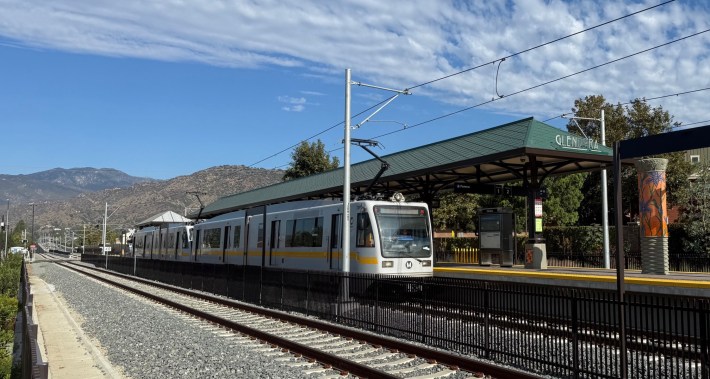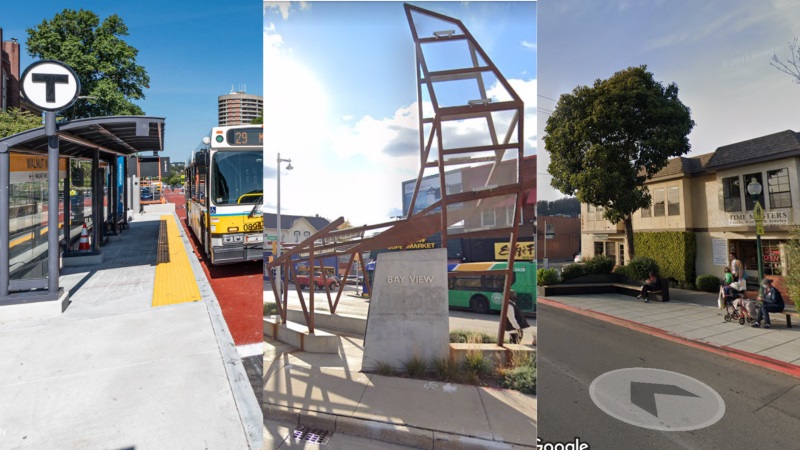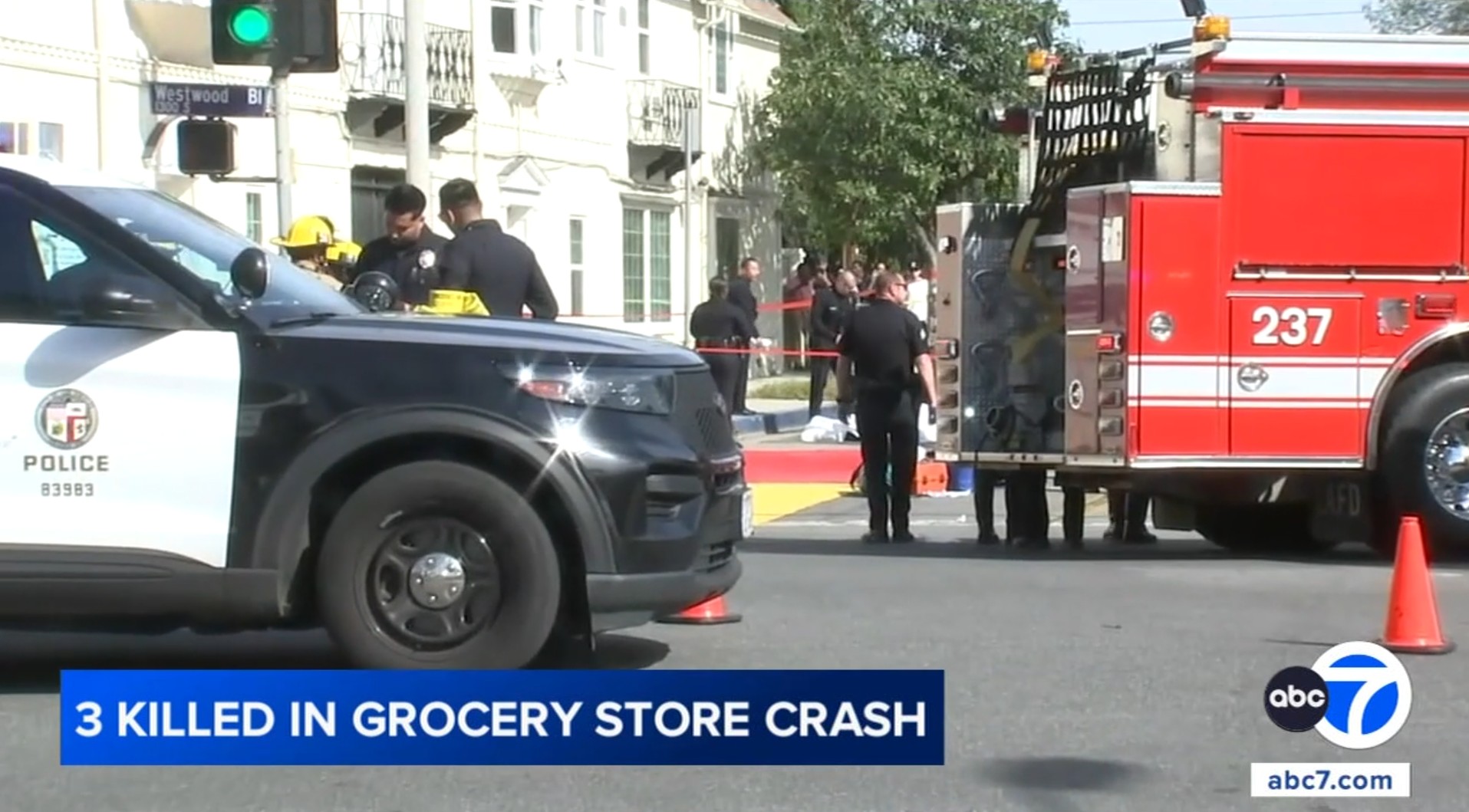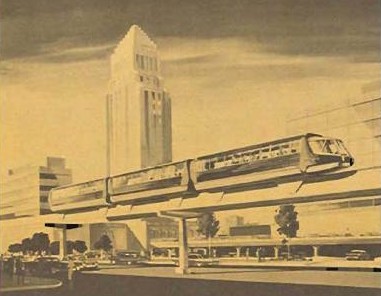The nominations are in, and it's time to embark on our quest to find America's best bus stops.
That's right: after years and years of sending up sorry stops across America, we're turning our attention to wonderful waiting areas for once. And we're kicking things off with some all-around solid stops that are not only great places to wait, but that perform some other critical functions for area residents — whether or not those residents ever get on board.
Unlike past March Madness-style contests at Streetsblog, we're switching things up by limiting ourselves to just 12 excellent contenders — and each one will have to clear a three-entry first-round match-up to reach the Final Four. That's right: your favorite stop will have to beat out two other contestants in order to clinch its spot in the second round, Thunderdome-style.
Check out the first three nominees, and don't forget to scroll to the bottom to vote — and check back on Friday for round 2.
Boston
If there's a number one seed in this contest, it may be the Massachusetts Bay Transportation Authority, which got the most nominations of any metro in America.
Our top pick, though, is this stop at Walnut Avenue along Boston's famous new Columbus Avenue busway — New England's first-ever center-running dedicated bus transitway. And while we're only voting on this specific stop today, it's important to note that this is just one of eight great shelters along the corridor.
Seriously, check out this fresh Elmo:

This stop was nominated by Eric Burkman, MBTA's Director of Transit Priority, who notes that the stop comes complete with a ton of special details:
- A larger shelter with tons of seating,
- Rapid transit-like branding and wayfinding,
- Real-time arrival screens with crowding information and audio announcements,
- Higher curbs that make getting on and off easy, particularly for folks with mobility challenges, and...
- Space already dedicated to off-board fare collection equipment planned for the future.
And because it serves a BRT line, riders who board at this stop will be able to breeze straight by car traffic, shaving about seven minutes off of the average commuter's daily ride.

If that long list of next-level amenities weren't enough, Burkman points out that this corridor runs down the center of the road, which helps radically recenter the entire streetscape around sustainable transportation.
"The unique configuration of the project means these aren’t just bus stops; they calm traffic on the corridor by providing chicanes, and they also serve as accessible pedestrian refuges, reducing the maximum number of lanes people have to cross from six to only two (where there are bus stops)," he added.

Of course, stops this stunning don't come cheap. The Columbus Avenue busway cost a reported $12 million — a fraction of the cost of a lot of highway projects, but definitely more than a lot of other stops in this contest. If you think America's Best Bus Stop should draw on design principles that are replicable absolutely everywhere, this might not be your pick.
Still, it's definitely a strong contender.
Milwaukee
We'll see a lot of stunning shelters in this contest, but none of them are quite as monumental as this Wisconsin waiting area, which is known locally as the Milwaukee Art Stop.
Located at the busy intersection of Kinnickinnic, Howell, and Lincoln Avenues and designed by local architect Román Montoto, this functional public art and ample greenscaping helps transform this "otherwise-boring traffic island into a community amenity," and that it "serves as a welcome center for those coming to the Bay View neighborhood" from the moment they deboard, said nominator Michael Dunst.
Dunst added that he particularly appreciates the stop's unique lighting details, which turn the simple steel, Plexiglass and concrete structure into "a canvas for the visual arts." Those lights, by the way, are powered by on-site solar panels, which make this sustainable stop even greener.

Now, bus stop beauty is definitely in the eye of the beholder, and not everyone's a fan of the postmodern aesthetic of this nominee. Some locals have even complained that the design could have offered riders a little more room under those angular overhangs, and maybe some seating options that are a little more comfortable than a concrete block. Others noted that the project cost about $200,000 and took three years to plan — money and time which some say could have been better used putting more modest shelters and benches throughout the Milwaukee area.
Still, there's no doubt that this bus stop is streets ahead of the stick-in-ground stops all over America, and that this stop doubles as an artistic salute to shared transportation.
Albany, Calif.
Here at Streetsblog, we love just about any project that transforms an underpriced on-street parking space into a true community amenity that anyone can enjoy. And this Bay Area waiting area was supposedly the first one in America that turned a former parking spot into a bona fide bus stop, which does triple duty as a gathering space, a nice place to sit, and simple but radical demonstration of how much we can do with the land that we currently devote to private car storage.
Located in the San Francisco suburb of Albany, this parking spot stop is actually just half of a larger stop + parklet combo, which is too big to fit on one screenshot. The project reclaimed the next couple of stops, too, and transformed them into a public seating area frequented by customers of Hal's Office Coffee next door.
The whole project is affectionately known as Hal's Parklet, and Project for Public Spaces profiled it in 2020.
"The parklet has brought a sense of place to the neighborhood and to the community of Albany, and it is especially evident that the parklet goes beyond serving as an extension of the [neighboring] businesses," wrote Miki Takeshita for PPS' blog. "Rather, it is a public park for all to enjoy, taken care of by a community business. No purchase is required ... to use the parklet."
Nominator Ben K. adds that the stop is "a great example of how a community can integrate bus stop location and design into its urban fabric and make streets safer, more welcoming, and more rider/pedestrian-friendly," a strategy that Streetsblog has long celebrated.

Like the other stops on this list, Hal's Parklet was the result of a lengthy planning and community engagement process, and it took heavy involvement from neighboring businesses and a Kickstarter campaign to get it over the finish line — which could be evidence of the community's investment in this space or a sign that this model would take some work to replicate in other places, depending on your perspective.
Still, it's a charmer — and it's up to you to decide whether it's a winner.
It's time to vote. Polls are open until Sunday, March 20 at 11:59 p.m. ET.
[poll id="204"]
Here's the full bracket if you're playing along at home.







